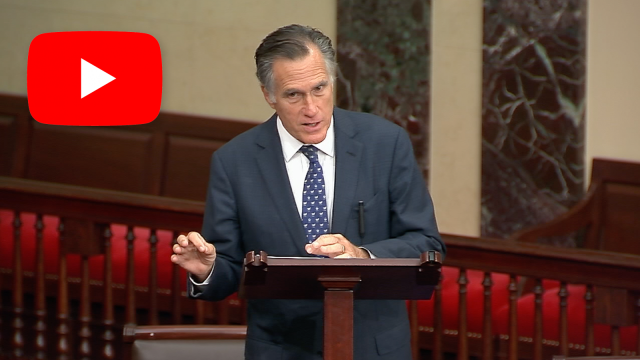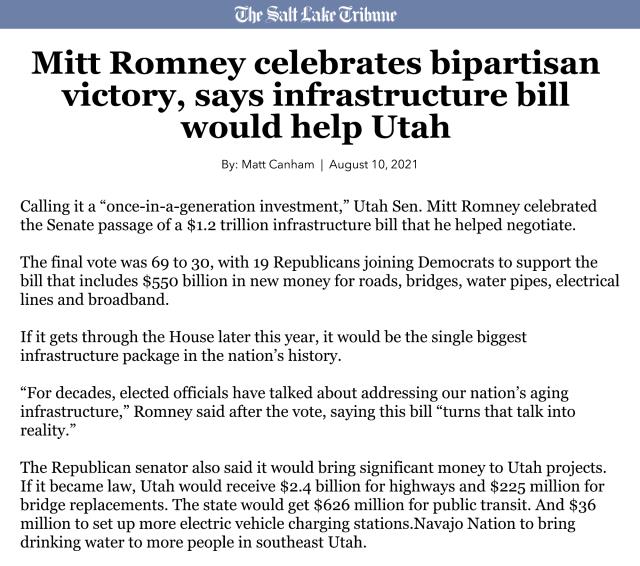 |
|
Yesterday, the Senate passed the Infrastructure Investment and Jobs Act with a large bipartisan majority. For decades, elected officials of both parties have talked about addressing our nation’s aging infrastructure. This bipartisan infrastructure bill finally turns that talk into reality.
While this bill is not perfect—as is the case with a true compromise—it provides a once-in-a-generation investment in our country’s physical infrastructure without raising taxes. That is what people and communities across the country demanded of us.
As one of the fastest growing states in the country, Utah is in serious need of additional infrastructure. This infrastructure bill would provide Utah the funding to construct new, and rebuild and maintain, its existing roads and highways. It would also help our state mitigate drought conditions, prepare for and respond to wildfires, continue expanding broadband to rural communities, and fulfill critical water needs—which includes funds to bring running water to a substantial part of Utah’s Navajo Nation.
I’m proud to have helped negotiate this bill because it gave Utah a seat at the table and benefits Americans across the country.

|
|
|

The Infrastructure Investment and Jobs Act was the work of bipartisan collaboration to address the decades of neglect of our nation’s physical infrastructure. This bipartisan bill represents $550 billion in new spending—not $1.2 trillion—and it includes fiscally responsible pay-fors, such as unused COVID-19 relief funds. The bill, which Senator Romney helped negotiate with his colleagues, passed the Senate by a vote of 69-30. It now heads to the House for consideration.
In a speech given on the Senate floor, Senator Romney countered misinformation being spread about the bill. His remarks highlighted the following facts:
- The bill is fully paid for with fiscally responsible pay-fors, not all of which follow the CBO’s methodology for scoring.
- It only addresses physical infrastructure–like roads, highways, bridges, broadband, water, and airports.
- The core of the bill went through regular order, passing out of four Senate committees with bipartisan support. Nearly 75% of the bill has been public for months—it wasn’t dropped out of nowhere.
- The bill does not allow the government to track personal driving habits. It includes a voluntary study to determine how electric cars can support the Highway Trust Fund so the burden isn't solely on those who pay a gas tax.


Read the full article here.

Senate Democrats are now pushing the largest spending bill in American history with a price tag of $3.5 trillion—an inordinate amount of money! Their “budget” proposal–written by Budget Committee Chairman Bernie Sanders–would drastically expand the federal government by creating wasteful programs that require excessive social spending, raising taxes on families and businesses. This reckless tax and spending spree would be detrimental to the fiscal health of our country for generations.
Moreover, half of the Democrats’ bill would be paid for with devastating tax increases on hardworking Americans. That's $1.75 trillion in revenue. Democrats also plan to super-charge the IRS and give tax cuts to the wealthy living in blue states. Senator Romney offered an amendment to try and prevent the largest tax increase in American history, levied on everyday Americans and businesses. The Senator will continue to fight this reckless spending bill as it moves through the Senate. |
|
     |
|
Unsubscribe |
|
 
|
|